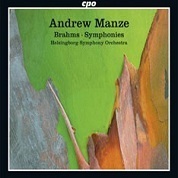The notes for this release contain the usual apologia from the conductor regarding the thorny issue of performance practice. This is a pity, for several reasons. In the first place, nothing that Manze says is new. The same sources have been discussed for years, notably (if we limit ourselves just to CD booklet notes) by Charles Mackerras for his Telarc Brahms cycle. For the record, Manze does at least cite Walter Blume’s adumbration of the Meiningen Court Orchestra’s Brahms tradition, noting that it essentially disproves the “myth” (Manze’s term) of no vibrato in 19th century performance of this music. Good for him.
However, the real reason that such essays are unfortunate stems from the fact that he is a baroque violinist trying to make a career for himself conducting classical and romantic repertoire with a standard symphony orchestra. For this reason, he needs to pass himself off as an expert in period performance practice—not just the period for which he is an acknowledged expert, but for any period corresponding to the music he happens to be conducting. This is his ticket of entry, as for so many of his colleagues, and it’s misleading because Manze has no more expertise in this music than any other conductor today, “historically informed” or not.
Discussion of performance practice in Brahms essentially comes down to two issues: size of the orchestra and tempo. Everything else, in grossly audible terms, is secondary. On these topics, there is little for Manze to discover that we don’t already know. Take the question of orchestra size. Did Brahms prefer a small or large orchestra? The answer is “large”, but Brahms preferred the best orchestras, and so he tolerated small ones too. Tradition favors large orchestras because the most important, prestige ensembles tend to be large, and audiences, never mind composers, quite naturally want the best, whether live or on disc. That’s it. Case closed.
Next, consider the issue of tempo. This boils down to a purely personal preference for strict time as opposed to a more flexible pulse–in other words, to Toscanini, Walter, and Klemperer vs. Furtwängler, Jochum, and Abendroth. Brahms liked a certain flexibility, but this doesn’t answer the question of just “how much”. Again, there is nothing that we don’t already know about this, and as the foregoing list of names suggests, there is no shortage of audible evidence documenting the legitimate range of truly authentic performance traditions in Brahms dating back to the composer’s own lifetime.
So Manze cannot claim any special legitimacy in this repertoire, and it is frankly embarrassing that listeners are asked, essentially, to applaud an artist simply for doing his homework and making interpretive decisions that by rights should be taken for granted. It’s a sign of insecurity, nothing more, and none of it answers the question that really matters: How well does Manze conduct Brahms? After all, you can be the greatest expert in the world on 19th century performance practice and still be a lousy conductor.
Manze is not lousy, but he’s not terribly compelling either. As you might expect from a period instrument specialist, these performances tend to be fast and light, particularly in the third movements and finales (of the Second and Third symphonies). The result, while not exactly metronomic, sounds shallow, clipped, and expressively neutered. In the exposition of the Third Symphony’s first movement, Manze employs a wide range of tempos (not a crime), but deploys them unconvincingly. He launches the allegro far too quickly to balance the slower, softer music that follows, and fails in the very elementary task of returning to tempo primo for the exposition repeat. The First Symphony’s introduction goes at almost the same speed as the allegro. Yes, it’s marked “poco sostenuto”, but then so is the single indicated slow-down in the Third’s first movement (just before the recapitulation), and Manze relaxes nicely there.
In other words, these are inconsistent interpretations. I like Manze’s quicker speed for the opening movement of the Second, but the concluding passacaglia of the Fourth lacks both majesty and, in its coda, rage—despite some very prominent trombones. On the whole, the playing seldom rises above the merely proficient. The strings in particular sometimes lack unanimity, especially at these swift tempos. Lapses in ensemble are small and never major, but they are clearly audible and annoying all the same.
I said at the start of this review that Manze was “a baroque violinist”, but this isn’t quite correct. He plays the baroque violin, but there is no such thing, obviously, as a baroque violinist. All players today start as traditional, modern musicians, so there is no inherent reason that Manze should not understand Brahms, or reveal himself as thoroughly comfortable with the romantic idiom. That he so often sounds out of sorts can only be the result of a deliberate effort. Performances of this sort represent the victory of cerebration over musicianship. It’s not a happy one.–David Hurwitz
































